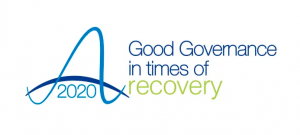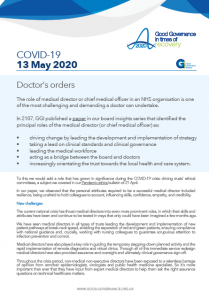Doctor's orders
13 May 2020

The role of medical director or chief medical officer in an NHS organisation is one of the most challenging and demanding a doctor can undertake.
In 2107, GGI published a paper in our board insights series that identified the principal roles of the medical director (or chief medical officer) as:
- driving change by leading the development and implementation of strategy
- taking a lead on clinical standards and clinical governance
- leading the medical workforce
- acting as a bridge between the board and doctors
- increasingly orientating the trust towards the local health and care system.
To this we would add a role that has grown in significance during the COVID-19 crisis: driving trusts’ ethical committees, a subject we covered in our Pandemic ethics bulletin of 21 April.
In our paper, we observed that the personal attributes required to be a successful medical director included resilience, being unafraid to hold colleagues to account, influencing skills, confidence, empathy, and credibility.
New challenges
The current national crisis has thrust medical directors into even more prominent roles, in which their skills and attributes have been and continue to be tested in ways that only could have been imagined a few months ago.
We have seen medical directors in all types of trusts leading the development and implementation of new patient pathways at break-neck speed, enabling the separation of red and green patients, ensuring compliance with national guidance and, crucially, working with nursing colleagues to guarantee scrupulous attention to infection prevention and control.
Medical directors have also played a key role in guiding the temporary stepping-down planned activity and the rapid implementation of remote diagnostics and virtual clinics. Through all of this immediate service redesign medical directors have also provided assurance and oversight and ultimately clinical governance sign-off.
Throughout the crisis period, non-medical non-executive directors have been exposed to a relentless barrage of opinion from armchair epidemiologists, virologists and public health medicine specialists. So it’s more important than ever that they have input from expert medical directors to help them ask the right assurance questions on technical healthcare matters.
Operational response
Medical directors have also been deeply embedded in the operational response as members of gold command, providing medical guidance and input to in-the-moment decisions impacting patients and staff, participating in local system, regional and national calls to ensure their trust’s voice is heard and that there is alignment, as much as is possible, between organisations and NHSE/I.
Critically, medical directors have been to the fore in designing new workforce approaches to a unique situation. Working with their senior colleagues they have played a crucial role in supporting and coaching their medical colleagues to take on new roles and to deal with the concerns and anxieties this brings.
Working within national guidance and aligned with the regulators, medical directors have designed workforce solutions that have seen consultant general surgeons working as ICU nurses and consultant ophthalmologists working as junior physicians.
Alongside all of this medical directors have not neglected the pastoral aspects of their role, counselling and supporting colleagues anxious for themselves and their families, dealing with the anger and frustrations of the PPE difficulties and of course for some the grief of losing a colleague.
Recovery and restoration
As we move into a new phase, medical directors face a new set of challenges. New patient pathways are being designed to enable safe restoration of patient services without compromising infection, prevention and control.
The restoration of services also requires medical directors to guide the clinical prioritisation process so that there is an equitable approach that serves the best interests of patients and the wider community, whilst also operating within the national framework recently set out by NHSE/I.
All of this is taking place within an environment where regulators are less present but with the certain knowledge that in due course decisions will have to be explained and justified.
As set out in our board insights paper, medical directors have led on service redesign and on clinical governance and they have acted as that all-important bridge to the medical workforce.
They have faced inwards to their colleagues and outwards to the system and regulators. The best have been empathetic, compassionate and humble. All have had their resilience and creativity tested as never before.
GGI recommends that board members should develop a better understanding of the role of the medical director. For board members who feel that they want a better understanding of what medical directors do the last few months have been a fantastic opportunity to learn.
Call to action
As we’ve seen, the role of medical director is complex and ever-changing and during the coronavirus crisis it has been making increasing demands of post-holders. It would serve non-executive board members well to improve their understanding by shadowing a medical director for a day – to get first-hand experience of the sheer range of what is expected and improve their understanding of the pressures that attend the role.
We are keen to hear your views. If this briefing prompts any questions or comments, please call us on 07732 681120 or email us at advice@good-governance.org.uk. We will aim to respond within 24 hours.

